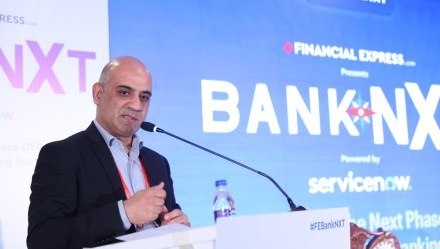The just concluded FEBankNXT conclave put together by The Financial Express Online saw some of the finest tech minds from the banking and financial arena brainstorm, swap ideas and share insights on ‘navigating the next phase of growth of the Indian banking sector’ – the theme of the conference. Eschewing futuristic twaddle and focussing instead on insights gained from the field experience, the tech practitioners shared their reading of the evolving banking and financial landscape.
The day-long meet began with the keynote address by Nitin Chugh, deputy managing director and head of digital banking and transformation at the State Bank of India (SBI).
Calling these as arguably the best of times for the Indian banking sector, Chugh said, this was so because most of the issues of the past have been addressed, many of the challenges have been overcome and all banks are today well capitalised, have healthy balance sheets and operate in an ecosystem that is seeing a good credit growth in the economy. The credit growth, he said, was driven by both consumption and also by the infrastructure spending happening in the country. All of it aiding the growth story of what is making India the fastest growing big economy. While he saw the banking sector best placed to leverage the digital transformation riding on India’s rather unique digital public infrastructure, he felt, in times to come cyber security had to remain at the core of all that is done. “Cyber security is something where you have to keep upping the game all the time because the surface area is a lot more today than what it used to be in the past,” he said. With a transition from platforms to networks, he said, especially in a network economy, cyber-resilience becomes extremely important. Also, consumers need to constantly be aware of their rights and responsibilities with a clear understanding of what to share, when to share and how.”
“The digital public infrastructure of India, as we have experienced over the five to six years and very proudly take this to the rest of the world, has matured to the extent that we are able to add new layers on top of that,” he said. “What started as Aadhaar and UPI (Unified Payments Interface) is now bringing together a reality where the financial inclusion-driven agenda is getting driven through DPI (Digital Public Infrastructure) at scale. The new layers – be it for healthcare or education or for commerce in the form of ONDC are all possible because we have a good digital public infrastructure,” he said. He felt, “one of the ways in which we have differentiated ourselves is that whatwever we have built has been built for public good.’
On digital transformation, he said, “we had a pre-UPI phase, where focus largely used to be on adding more features to an app and on helping customers migrate to using digital channels for banking. The second phase between 2016 and 2018 saw an explosion in payments.” He then went to explain the current phase: “What are going through right now is seeing an unfolding of three things from a banking perspective: 1, We do not have a technology arbitrage anymore and everybody has modernised and not just the fintechs and everybody is using the same modes and workflows. 2, the data that we have generated over the last five to seven years is machine generated data and not human generated with errors and it is possible to keep refining and training the models to an extent that there is sharper precision in whatever we do. 3, and thirdly, while there is DPI there has also been a lot of legislative and regulatory changes which have opened up new business avenues and in general we have a very enabling environment which is helping everyone shape the future both in the private and public sector.”
Seen from this perspective, he felt, it was quite possible to imagine that a bank of the future could very well be an AI bank, a very intelligent bank that could be one that really understands its customers, has a lot of data science capabilities and is able to do things in a manner that it is truly personal and relatable to the consumers and doing it in within the regulatory framework.
He however reminded again that “data has to be held and managed responsibly.” At SBI for instance, he said, “we are looking very seriously at responsible AI, ethical AI and we have had a framework for this for the past four or five years now and we are only enhancing that to make sure that it stays contemporary.” More recently, he said, “we also tied up with IIT, Mumbai and have set up a centre for data science and analytics within its campus where we look at all the research and come up with things that are of use for the entire industry and not just for us. We want to train people in generative AI, data science leveraging the cutting-edge academia that IIT Mumbai has and hopefully take the fruits of these to all the customers.”
The FE BankNXT, powered by Service Now, just concluded in the Indian financial capital of Mumbai.
